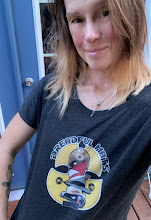
I am Glenda Adams' daughter (her only child) and damn proud of it. She died in 2007, and I miss her more than I can explain. I think of her every day.
So, I am re-reading her work, starting with her first book, Lies and Stories, a collection of nine short stories, published in 1976.
The first story, "Lies," is an iconic one for me. I remember reading it way back, probably in the 1980s, when I was a teenager.
To me, the story is about writing and imagination. (And about how adults respond to a quirky, imaginative child in ways of which my mother probably disapproved.) "Sometimes I tell lies, and sometimes I only tell stories, but never with intent to harm. I only want to please people and make them happy." I can hear my mother's voice through the words she gives her 10-year-old narrator, Josephine.
In "Lies," Josephine describes her family, inspired by a school assignment to "write the story of our family."
Adams (I'll write "Adams" because I feel strange writing "my mother" repeatedly) captures how a 10-year-old absorbs and repeats the words of the surrounding adults accurately. But Josephine both lacks mature understanding (though she understands -- or imagines -- much) and reveals so much about the particular characters in her life -- and their possible dysfunctions. I write "possible" because the reader cannot be sure that the whole story is not a lie. I don't know if Adams ever decided whether Josephine's story were "true" or not. I lean toward thinking her story is "true" based on two pieces of evidence in the story:
1) Her mother responds negatively to Josephine saying, "But I like Uncle Roger. I don't want him to go." Josephine backpedals, "I was kidding. I don't like him. And I want him to go away." But the "truth" was probably her first statement.
2) Her teacher asks her, "This isn't the real story of your family, is it? You made it up, didn't you?" Josephine pauses before answering, "Yes, I made it all up. I thought you meant us to."
So this is a girl who tells the truth, unless it displeases, in which case she says what people want to hear.
Then again... Josephine is a very imaginative, creative child. She could be enjoying making up things, such as her best friend actually being her half sister and her mother and Uncle Roger moved far away to Vancouver. And then she backs off when she realizes her "lies" are not entertaining.
The story feels young to me. Is this the immature narrator? Or the young writer that Adams was (more than two years younger that I am now)? Or is it that I read it as a young woman, and I know when my mother wrote it?

Hi there - great blog idea. I know my mum has also been re-reading your mum's works. I should too - I remember that Dancing on Coral was my favourite - but I never read the Tempest of Clemenza. I read Lies and Stories when I was a kid too. I think I was just bored and it was sitting on the shelf. I probably didn't really 'get' it - I should re-read it now.
ReplyDeleteI think about your mum a lot too. I'm very sad that she never got to meet Astrid and Rene. I really think that they would have got on.
You're such a good writer! You make your man proud.
ReplyDelete